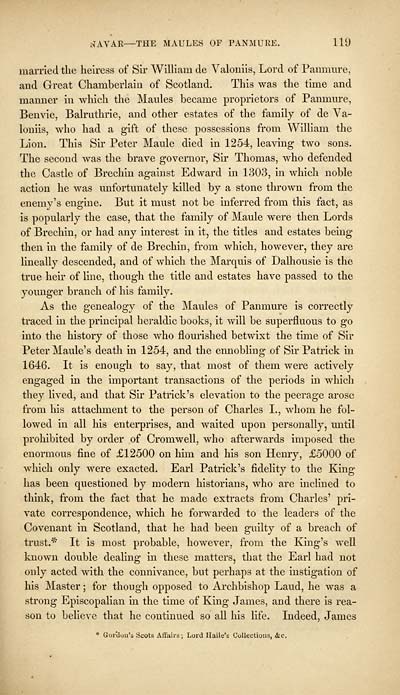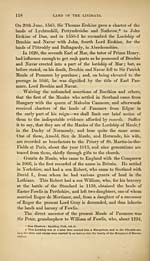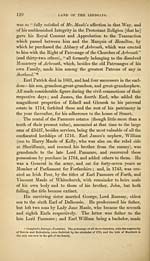Download files
Complete book:
Individual page:
Thumbnail gallery: Grid view | List view

tfAVAR — THE MAULES OF PANMURE. 119
married the heiress of Sir William de Valoniis, Lord of Panmure,
and Great Chamberlain of Scotland. This was the time and
manner in which the Maules became proprietors of Panmure,
Benvie, Balrnthrie, and other estates of the family of de Va-
loniis, who had a gift of these possessions from William the
Lion. This Sir Peter Maule died in 1254, leaving two sons.
The second was the brave governor, Sir Thomas, who defended
the Castle of Brechin against Edward in 1303, in which noble
action he was unfortunately killed by a stone thrown from the
enemy's engine. But it must not be inferred from this fact, as
is popularly the case, that the family of Maule were then Lords
of Brechin, or had any interest in it, the titles and estates being-
then in the family of de Brechin, from which, however, they are
lineally descended, and of which the Marquis of Dalhousie is the
true heir of line, though the title and estates have passed to the
younger branch of his family.
As the genealogy of the Maules of Panmure is correctly
traced in the principal heraldic books, it will be superfluous to go
into the history of those who flourished betwixt the time of Sir
Peter Maule's death in 1254, and the ennobling of Sir Patrick in
1646. It is enough to say, that most of them were actively
engaged in the important transactions of the periods in which
they lived, and that Sir Patrick's elevation to the peerage arose
from his attachment to the person of Charles I., whom he fol-
lowed in all his enterprises, and waited upon personally, until
prohibited by order of Cromwell, who afterwards imposed the
enormous fine of £12500 on him and his son Henry, £5000 of
which only were exacted. Earl Patrick's fidelity to the King
has been questioned by modern historians, who are inclined to
think, from the fact that he made extracts from Charles' pri-
vate correspondence, which he forwarded to the leaders of the
Covenant in Scotland, that he had been guilty of a breach of
trust.* It is most probable, however, from the King's well
known double dealing in these matters, that the Earl had not
only acted with the connivance, but perhaps at the instigation of
his Master ; for though opposed to Archbishop Laud, he was a
strong Episcopalian in the time of King James, and there is rea-
son to believe that he continued so all his life. Indeed, James
* Gordon's Scots Affairs ; Lord Haile's Collections, &c.
married the heiress of Sir William de Valoniis, Lord of Panmure,
and Great Chamberlain of Scotland. This was the time and
manner in which the Maules became proprietors of Panmure,
Benvie, Balrnthrie, and other estates of the family of de Va-
loniis, who had a gift of these possessions from William the
Lion. This Sir Peter Maule died in 1254, leaving two sons.
The second was the brave governor, Sir Thomas, who defended
the Castle of Brechin against Edward in 1303, in which noble
action he was unfortunately killed by a stone thrown from the
enemy's engine. But it must not be inferred from this fact, as
is popularly the case, that the family of Maule were then Lords
of Brechin, or had any interest in it, the titles and estates being-
then in the family of de Brechin, from which, however, they are
lineally descended, and of which the Marquis of Dalhousie is the
true heir of line, though the title and estates have passed to the
younger branch of his family.
As the genealogy of the Maules of Panmure is correctly
traced in the principal heraldic books, it will be superfluous to go
into the history of those who flourished betwixt the time of Sir
Peter Maule's death in 1254, and the ennobling of Sir Patrick in
1646. It is enough to say, that most of them were actively
engaged in the important transactions of the periods in which
they lived, and that Sir Patrick's elevation to the peerage arose
from his attachment to the person of Charles I., whom he fol-
lowed in all his enterprises, and waited upon personally, until
prohibited by order of Cromwell, who afterwards imposed the
enormous fine of £12500 on him and his son Henry, £5000 of
which only were exacted. Earl Patrick's fidelity to the King
has been questioned by modern historians, who are inclined to
think, from the fact that he made extracts from Charles' pri-
vate correspondence, which he forwarded to the leaders of the
Covenant in Scotland, that he had been guilty of a breach of
trust.* It is most probable, however, from the King's well
known double dealing in these matters, that the Earl had not
only acted with the connivance, but perhaps at the instigation of
his Master ; for though opposed to Archbishop Laud, he was a
strong Episcopalian in the time of King James, and there is rea-
son to believe that he continued so all his life. Indeed, James
* Gordon's Scots Affairs ; Lord Haile's Collections, &c.
Set display mode to:
![]() Universal Viewer |
Universal Viewer | ![]() Mirador |
Large image | Transcription
Mirador |
Large image | Transcription
Images and transcriptions on this page, including medium image downloads, may be used under the Creative Commons Attribution 4.0 International Licence unless otherwise stated. ![]()
| Histories of Scottish families > History and traditions of the land of the Lindsays in Angus and Mearns > (137) Page 119 |
|---|
| Permanent URL | https://digital.nls.uk/94870670 |
|---|
| Description | A selection of almost 400 printed items relating to the history of Scottish families, mostly dating from the 19th and early 20th centuries. Includes memoirs, genealogies and clan histories, with a few produced by emigrant families. The earliest family history goes back to AD 916. |
|---|

